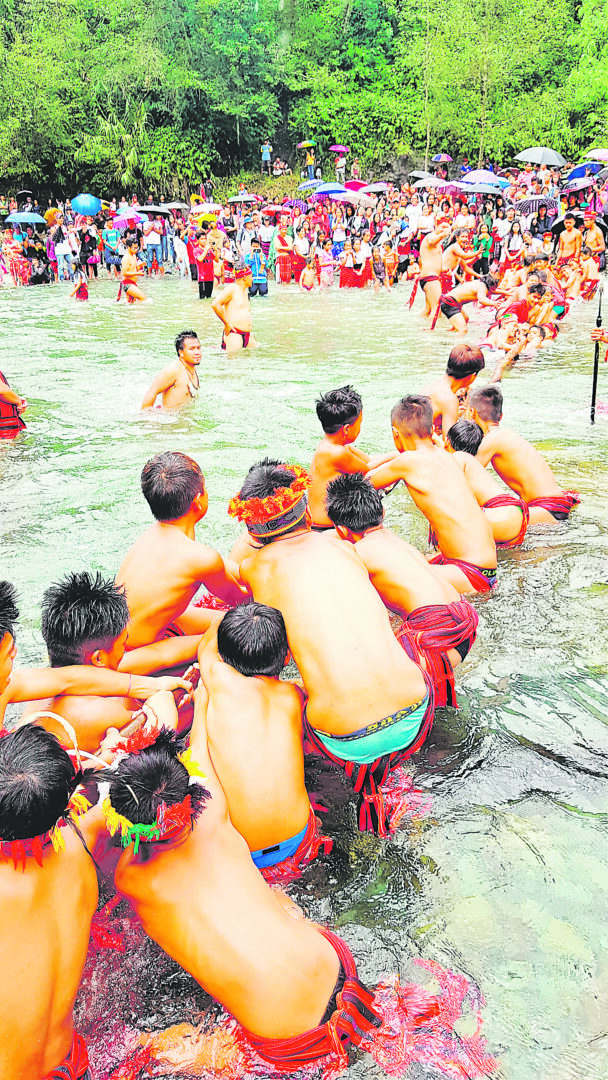The local government of Hungduan in the province of Ifugao in northern Luzon has set 2 August for the performance of the internationally recognized, indigenous ritual punnuk, marked by guyyod or tug-of-war game.
“The public is hereby invited to join us in the celebration. Come with your native attire or native-inspired attire,” said Hungduan Mayor Cesar P. Dumulag in the municipal advisory, issued on 27 July.
The punnuk was originally scheduled for 29 July, but was postponed because typhoon ‘Egay’ (Doksuri) has been adversely affected northern Luzon and other parts of the country, causing flooding on agricultural lands and residential areas. Storm signal number 2 was hoisted on Ifugao and the rest of the Cordillera region last week.

Punnuk is the culminating part of the Tuwali Ifugao post-harvest ritual called huwah, a thanksgiving celebration for harvest of the year and a way to ensure a good one the following year. The huwah is known to be practiced by only three communities in the whole of Ifugao — the barangays of Hapao, Ba-ang and Nungulunan in Hungduan — which are located around a cluster of rice terraces and near the Hapao River.
The dumupag, a kadangyan or wealthy-class family designated in leading the huwah and other agricultural activities, spearheads in the performance of the huwah, which starts with the baki ritual. They will acquire the services of the mumbaki, an Ifugao ritual specialist or shaman, to conduct the baki, which includes the declaration of the conclusion of harvest, consumption of food and wine, animal sacrifice and divination through the sacrificial chicken’s gallbladder to determine if conditions are good to hold the punnuk the following day.
If the mumbaki sees that the blood and gallbladders of the sacrificial chickens augur well, he walks to an open area to chant, signifying the end of the baki and that a punnuk can be held tomorrow. One of the men seconded by announcing to the whole community about the punnuk tomorrow, perching on a high place and shouting. This will be repeated at another site.
The baki is followed by the second part of huwah, the inum or the drinking of bayah or rice wine. Residents also prepare the pakkid, the thin trunk of a tree, usually the attoba, with a hook at one end, to be used in punnuk instead of the usual rope.
The following morning, residents of the three barangays will converge at the fork of Hapao River, called nunhipukana, for the punnuk. Before the competition, they hector or tease each other. The guyyod or tug-of-war happens on the river itself with its rushing waters. Other games are played such as the bultong or wresting.
After the punnuk, the kina-ag, an anthropomorphic object made rice straws, vines and leaves, is thrown at the river to let people who live downstream know that a punnuk has concluded. Attendees are encouraged to bathe in the river to wash away bad luck.
Said to be a very old practice, the huwah is said to be not practiced for many years and was revived about 26 years ago. In recent years, the huwah was not performed in 2020 and 2021 because of the lockdowns and restrictions imposed because of the coronavirus pandemic. It was resumed in 2022.
The punnuk was inscribed in the UNESCO (United Nations Educational, Scientific and Cultural Organization) Representative List of Intangible Cultural Heritage of Humanity together with other tugging rituals from Cambodia, Korea and Vietnam in 2015. The List comprises intangible cultural heritage (ICH) elements around the world deemed important for safeguarding and more awareness.
The indigenous Ifugao people has two ICH elements inscribed in the UNESCO Representative List of Intangible Cultural Heritage of Humanity — the punnuk and the chant called hudhud — and one site inscribed in the UNESCO World Heritage list — the five clusters of rice terraces in the province including one in Hungduan.
